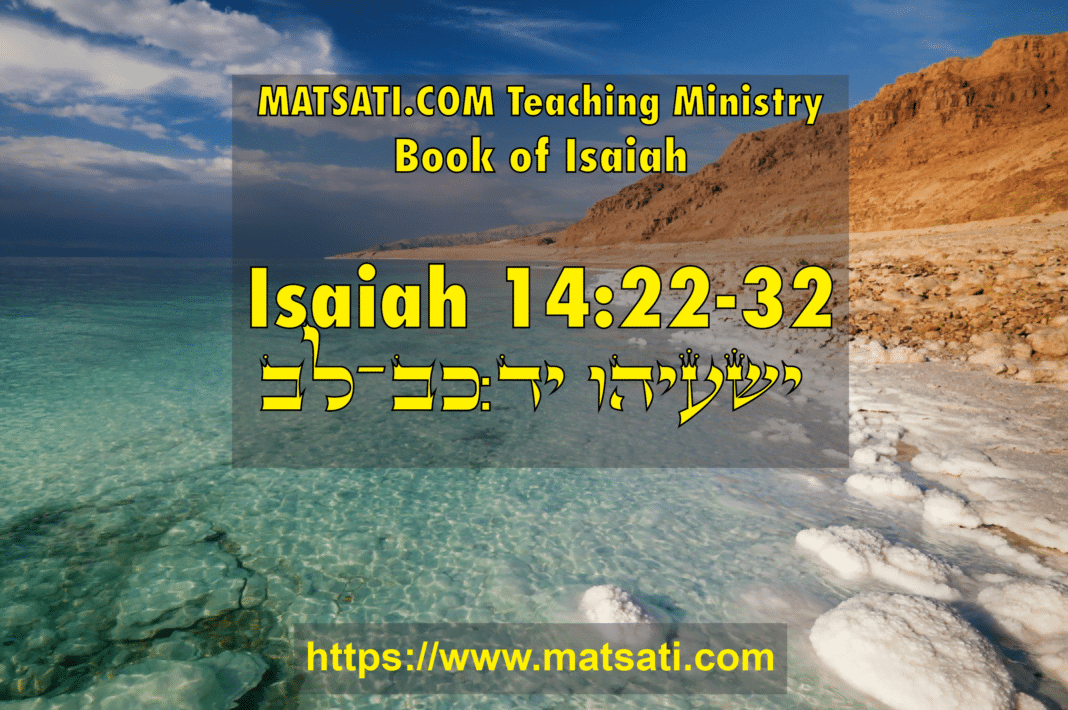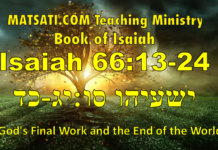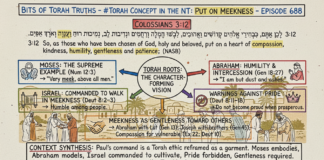Table of Contents
Introduction to Isaiah 14:22-32
Many commentators believe Isaiah talking about Babylon was a later redaction of the text. The prophecy of Isaiah however is connected to the previous prophetic words through the ongoing discussion about the pride of the people, the king, and the nation, and even of the angelic host, those demonic forces the nations serve. Those commentators who place this chapter as post-exilic have a lack of faith, not believing that God is able to speak of future events. The idea of pride going before the one who falls or who is brought low is the consistent theme which demonstrates that this is a prophetic word from God given to Isaiah! All of these things center upon the power of God who promises to redeem His people, like he did in the days of Moshe and Aaron, He will do for these people, though they are stubborn, are called to repent and turn from their sins. Pride and Babylon represents the power and glory of this world, the things which men seek out over and above the Lord God in heaven. The desire for fame, power, wealth is very powerful when one walks in the flesh. Because of these truths all of Scripture can be taken as a compositional whole, where there is a continuity that goes throughout all of God’s Word, which describes who God is, loving, merciful, and full of grace, and we are called to trust in Him regardless of our situation. The overall scheme, the overarching conclusions, are related to the Torah centric principles of God’s desire to dwell in our midst, and by our faith in the Messiah Yeshua, we receive the presence of God, His Holy Spirit dwelling within, empowering us to overcome this world, and to live our lives for His glory! The Scriptures tell us that God’s judgment comes to those who refuse to listen to His voice. These words of Isaiah are calling us to repent and turn from our ways, to seek the Lord, and to walk in His ways! Isaiah continues saying the following:
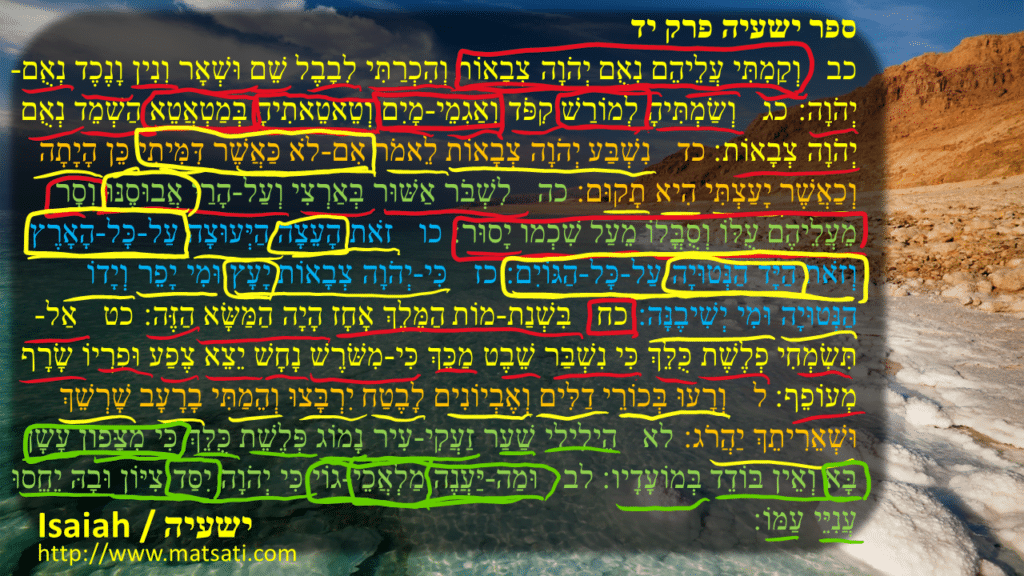
ספר ישעיה פרק יד
כב וְקַמְתִּי עֲלֵיהֶם נְאֻם יְהֹוָה צְבָאוֹת וְהִכְרַתִּי לְבָבֶל שֵׁם וּשְׁאָר וְנִין וָנֶכֶד נְאֻם-יְהֹוָה: כג וְשַֹמְתִּיהָ לְמוֹרַשׁ קִפֹּד וְאַגְמֵי-מָיִם וְטֵאטֵאתִיהָ בְּמַטְאֲטֵא הַשְׁמֵד נְאֻם יְהֹוָה צְבָאוֹת:
Isaiah 14:22 states, “For I will rise up against them, saith the LORD of hosts, (וְקַמְתִּי עֲלֵיהֶם נְאֻם יְהֹוָה צְבָאוֹת) and cut off from Babylon the name, and remnant, and son, and nephew, saith the LORD. (וְהִכְרַתִּי לְבָבֶל שֵׁם וּשְׁאָר וְנִין וָנֶכֶד נְאֻם-יְהֹוָה)” Isaiah 14:23 “I will also make it a possession for the bittern, and pools of water: (וְשַֹמְתִּיהָ לְמוֹרַשׁ קִפֹּד וְאַגְמֵי-מָיִם) and I will sweep it with the besom of destruction, saith the LORD of hosts. (וְטֵאטֵאתִיהָ בְּמַטְאֲטֵא הַשְׁמֵד נְאֻם יְהֹוָה צְבָאוֹת)” The outcome of pride is the fall, Isaiah 14:22 demonstrates that even on an individual basis, the Lord says, וְקַמְתִּי עֲלֵיהֶם נְאֻם יְהֹוָה צְבָאוֹת וְהִכְרַתִּי “For I will rise up against them, saith the LORD of hosts, and cut off.” Even on the individual basis, the Lord stands against pride! These verses stand to demonstrate the weightiness of pride and its effects leading to sin and rebellion. Note this indicates how the Lord God in heaven is always directly involved in history, in the lives of men. When a nation falls, a government, a king, or even an individual falls, this is due to the Lord God working for His purposes. Keeping this in mind helps us to walk the narrow path. These things are a reminder for us today to take these words very seriously and not fail to listen and obey, especially to not ignore these words and destroy ourselves through ignorance to sin!
ספר ישעיה פרק יד
כד נִשְׁבַּע יְהֹוָה צְבָאוֹת לֵאמֹר אִם-לֹא כַּאֲשֶׁר דִּמִּיתִי כֵּן הָיָתָה וְכַאֲשֶׁר יָעַצְתִּי הִיא תָקוּם:
Isaiah 14:24 states “The LORD of hosts hath sworn, saying, (נִשְׁבַּע יְהֹוָה צְבָאוֹת לֵאמֹר) Surely as I have thought, so shall it come to pass; and as I have purposed, so shall it stand: (אִם-לֹא כַּאֲשֶׁר דִּמִּיתִי כֵּן הָיָתָה וְכַאֲשֶׁר יָעַצְתִּי הִיא תָקוּם)” This verse speaks to the power of God saying what God thinks will come to pass. This sounds similar to Isaiah 55:11 So shall my word be that goeth forth out of my mouth: it shall not return unto me void, but it shall accomplish that which I please, and it shall prosper in the thing whereto I sent it. (KJV, כֵּ֣ן יִֽהְיֶ֤ה דְבָרִי֙ אֲשֶׁ֣ר יֵצֵ֣א מִפִּ֔י לֹֽא־יָשׁ֥וּב אֵלַ֖י רֵיקָ֑ם כִּ֤י אִם־עָשָׂה֙ אֶת־אֲשֶׁ֣ר חָפַ֔צְתִּי וְהִצְלִ֖יחַ אֲשֶׁ֥ר שְׁלַחְתִּֽיו׃) This is the power of God’s promises in our lives, powerful! The scripture translates אִם-לֹא כַּאֲשֶׁר דִּמִּיתִי “if it is not as…” which is a way the Lord establishes by His own self that the thing he proclaims will be accomplished. This is the surety that the very thing God is going to do is established upon who He is, the Almighty. The power of God is present based upon our intention, our faith, whether we believe or not.
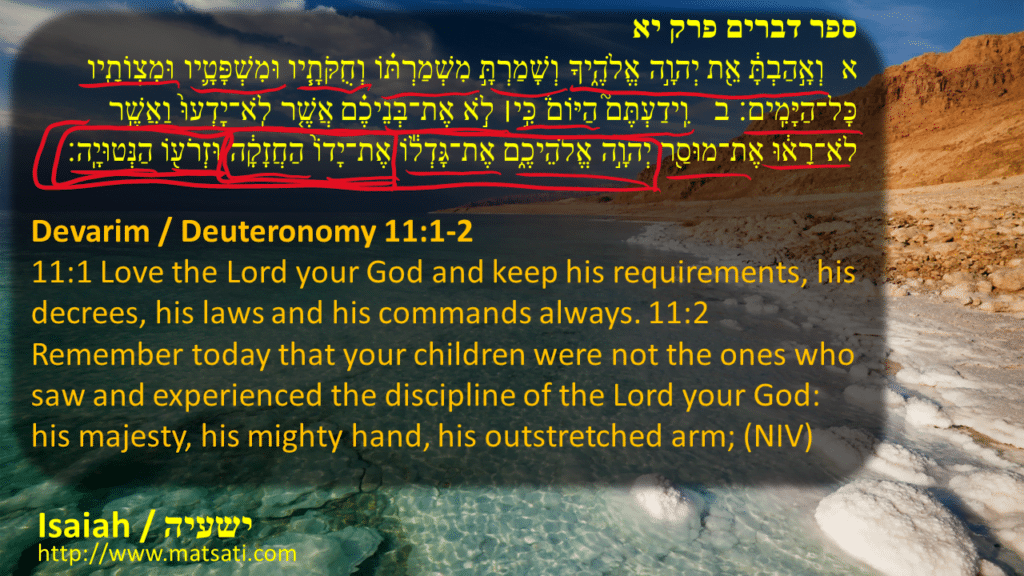
ספר דברים פרק יא
א וְאָ֣הַבְתָּ֔ אֵ֖ת יְהוָ֣ה אֱלֹהֶ֑יךָ וְשָׁמַרְתָּ֣ מִשְׁמַרְתּ֗וֹ וְחֻקֹּתָ֧יו וּמִשְׁפָּטָ֛יו וּמִצְוֺתָ֖יו כָּל־הַיָּמִֽים׃ ב וִֽידַעְתֶּם֮ הַיּוֹם֒ כִּ֣י׀ לֹ֣א אֶת־בְּנֵיכֶ֗ם אֲשֶׁ֤ר לֹֽא־יָדְעוּ֙ וַאֲשֶׁ֣ר לֹא־רָא֔וּ אֶת־מוּסַ֖ר יְהוָ֣ה אֱלֹהֵיכֶ֑ם אֶת־גָּדְל֕וֹ אֶת־יָדוֹ֙ הַחֲזָקָ֔ה וּזְרֹע֖וֹ הַנְּטוּיָֽה׃
Devarim / Deuteronomy 11:1-2
11:1 Love the Lord your God and keep his requirements, his decrees, his laws and his commands always. 11:2 Remember today that your children were not the ones who saw and experienced the discipline of the Lord your God: his majesty, his mighty hand, his outstretched arm; (NIV)
The Torah tells us that because God has been so good and loving, His people are to love Him and keep His commandments in return. Note how this is an afterthought, obeying God’s word comes following our having faith and believing. This is illustrated in the sign of circumcision, that Abraham was saved prior to his being circumcised. Circumcision was a sign of the covenant; it was not meant to cause one to get into the covenant with God. Same with the Shabbat. The Sabbath rest is a sign of the covenant, it is not a means for one to get into the covenant with God. These two examples are an outcome of our faith, and function as a sign of the covenant promises. There are many who get these things backwards. Moshe said, “You who have seen God do amazing things over the last forty years are the ones to whom I am speaking. You were children and teenagers when God struck the Egyptians with the plagues to free you from slavery. You saw the Egyptian chariots engulfed in the Red Sea.” Moshe is reminding the people of the power of God’s outstretched arm, and how the Lord was making it clear that faith takes precedence in matters of obedience. If we believe, we will obey His Holy Word and be blessed. If we do not believe, we disobey His Holy Word and be cursed. In the Rabbinical Hebrew there is a Greek loan word “parakletos” which means “advocate” as in the case of defense attorneys. The rabbinic understanding was the more faithful a person was to God, which was demonstrated by obedience, the more parakletos he would be given. Because of God’s great love, we should be so motivated by faith and love, to seek Him and His presence in our lives! This is what is lacking in the nations due to their lack of faith and their pride they will fall the example is given of the Assyrians.
ספר ישעיה פרק יד
כה לִשְׁבֹּר אַשּׁוּר בְּאַרְצִי וְעַל-הָרַי אֲבוּסֶנּוּ וְסָר מֵעֲלֵיהֶם עֻלּוֹ וְסֻבֳּלוֹ מֵעַל שִׁכְמוֹ יָסוּר:
Isaiah 14:25 states, “That I will break the Assyrian in my land, (לִשְׁבֹּר אַשּׁוּר בְּאַרְצִי) and upon my mountains tread him under foot: (וְעַל-הָרַי אֲבוּסֶנּוּ) then shall his yoke depart from off them, and his burden depart from off their shoulders. (וְסָר מֵעֲלֵיהֶם עֻלּוֹ וְסֻבֳּלוֹ מֵעַל שִׁכְמוֹ יָסוּר)” We note how the Lord God is always reaching out to His people. This explains why God via His Holy Spirit is calling us even before we have faith! The Lord God Almighty is merciful, He is a moral and ethical God, and wants justice and peace among people. This is why Isaiah writes what he does concerning the Assyrian army and the Lord causing the yoke of the Assyrians to depart from off their shoulders (וְסָר מֵעֲלֵיהֶם עֻלּוֹ וְסֻבֳּלוֹ מֵעַל שִׁכְמוֹ יָסוּר). This reference to God אֲבוּסֶנּוּ “treading down” the army, some commentators believe this to be the destruction of Sennacherib’s army in 701 BC. Ezekiel also describes the destruction of Israel’s armies on the mountains according to Ezekiel 39: 4 and 39:17.
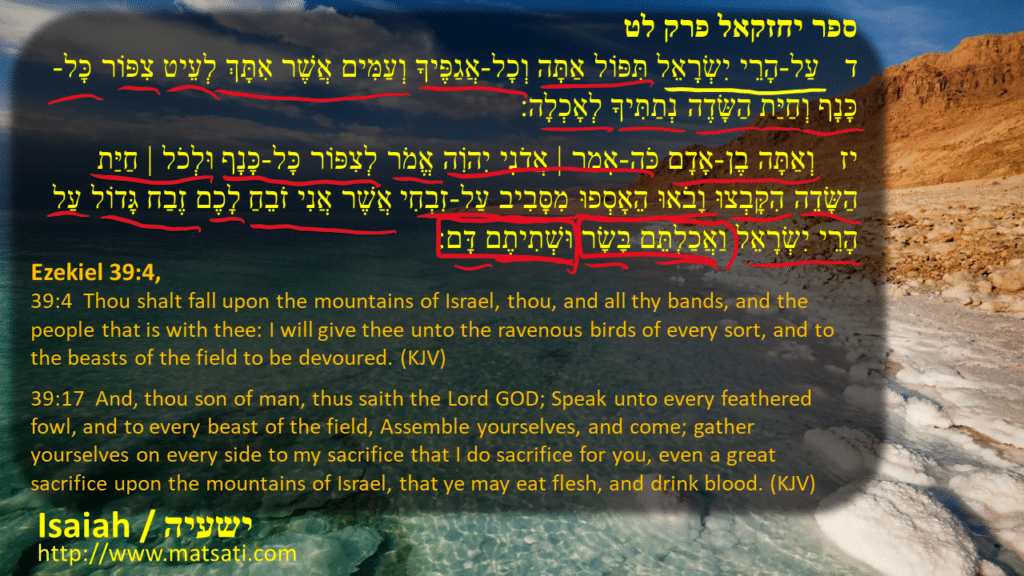
ספר יחזקאל פרק לט
ד עַל-הָרֵי יִשְֹרָאֵל תִּפּוֹל אַתָּה וְכָל-אֲגַפֶּיךָ וְעַמִּים אֲשֶׁר אִתָּךְ לְעֵיט צִפּוֹר כָּל-כָּנָף וְחַיַּת הַשָּׂדֶה נְתַתִּיךָ לְאָכְלָה:
יז וְאַתָּה בֶן-אָדָם כֹּה-אָמַר | אֲדֹנָי יְהוִֹה אֱמֹר לְצִפּוֹר כָּל-כָּנָף וּלְכֹל | חַיַּת הַשָּׂדֶה הִקָּבְצוּ וָבֹאוּ הֵאָסְפוּ מִסָּבִיב עַל-זִבְחִי אֲשֶׁר אֲנִי זֹבֵחַ לָכֶם זֶבַח גָּדוֹל עַל הָרֵי יִשְֹרָאֵל וַאֲכַלְתֶּם בָּשָֹר וּשְׁתִיתֶם דָּם:
Ezekiel 39:4, 39:17
39:4 Thou shalt fall upon the mountains of Israel, thou, and all thy bands, and the people that is with thee: I will give thee unto the ravenous birds of every sort, and to the beasts of the field to be devoured. (KJV)
39:17 And, thou son of man, thus saith the Lord GOD; Speak unto every feathered fowl, and to every beast of the field, Assemble yourselves, and come; gather yourselves on every side to my sacrifice that I do sacrifice for you, even a great sacrifice upon the mountains of Israel, that ye may eat flesh, and drink blood. (KJV)
The point is to those who are unfaithful, their hope is not in the Lord. This goes as a testimony to what David and his men did (1 Samuel 21) of sanctifying themselves for the purpose of war, such that their hope in a holy and righteous God would be effective. You know this same truth is taught in the NT text?
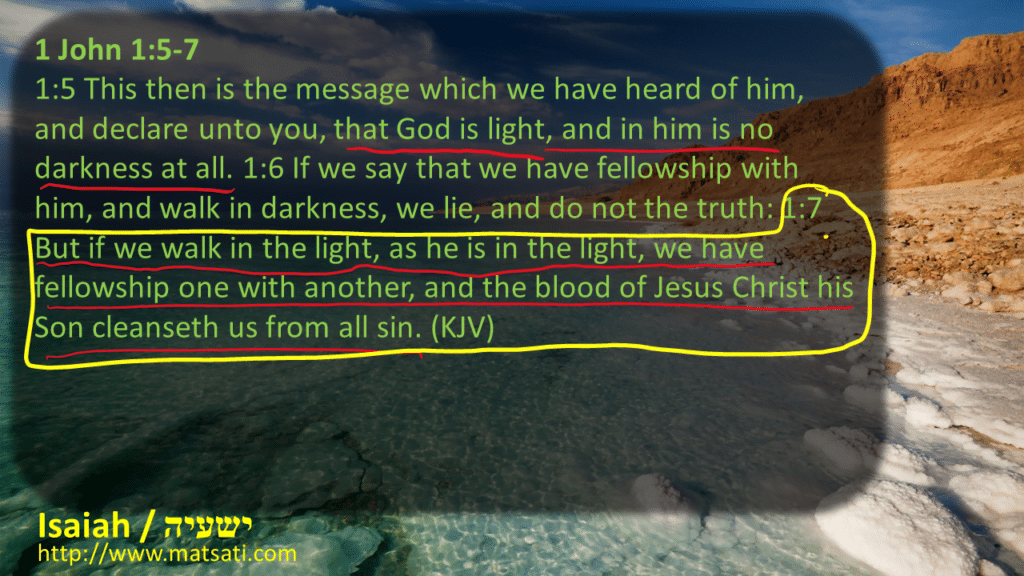
1 John 1:5-7
1:5 This then is the message which we have heard of him, and declare unto you, that God is light, and in him is no darkness at all. 1:6 If we say that we have fellowship with him, and walk in darkness, we lie, and do not the truth: 1:7 But if we walk in the light, as he is in the light, we have fellowship one with another, and the blood of Jesus Christ his Son cleanseth us from all sin. (KJV)
Note how John phrases these passages. If we walk in the light. The light is paralleled to righteousness and the act of setting ourselves apart as holy unto the Lord. If we do these things, then the blood of Yeshua will cleanse us. If we do not walk in righteousness, what do you think will be the end result? This again speaks to having the proper kavanah, the proper intention and motivation, to have faith and walk in that faith (faithfulness). Notice the parallel to the Torah command; these things illustrate the continuity of the Torah command throughout all of the Scriptures from beginning to end! The removal of the yoke, which is a burden that is placed on beasts, is reminiscent of Isaiah 9:3 (English see Isaiah 9:4) and Isaiah 10:27. This follows through providing a continuity in the Isaiah text such that the Isaiah is a compositional whole and not a series of redacted texts. Isaiah continues saying,
ספר ישעיה פרק יד
כו זֹאת הָעֵצָה הַיְּעוּצָה עַל-כָּל-הָאָרֶץ וְזֹאת הַיָּד הַנְּטוּיָה עַל-כָּל-הַגּוֹיִם: כז כִּי-יְהֹוָה צְבָאוֹת יָעָץ וּמִי יָפֵר וְיָדוֹ הַנְּטוּיָה וּמִי יְשִׁיבֶנָּה:
Isaiah 14:26 states, ”This is the purpose that is purposed upon the whole earth: (זֹאת הָעֵצָה הַיְּעוּצָה עַל-כָּל-הָאָרֶץ) and this is the hand that is stretched out upon all the nations. (וְזֹאת הַיָּד הַנְּטוּיָה עַל-כָּל-הַגּוֹיִם)” Isaiah 14:27 “For the LORD of hosts hath purposed, and who shall disannul it? (כִּי-יְהֹוָה צְבָאוֹת יָעָץ וּמִי יָפֵר) and his hand is stretched out, and who shall turn it back? (וְיָדוֹ הַנְּטוּיָה וּמִי יְשִׁיבֶנָּה)” These verses describe how the Lord is the One who is judge over all of the nations of the earth. This is illustrated by וְזֹאת הַיָּד הַנְּטוּיָה עַל-כָּל-הַגּוֹיִם “and this is the hand that is stretched out upon all the nations.” The Lord stretches out his arm, this is not the same as the Lord God taking us under His wing. The הַיָּד הַנְּטוּיָה the out stretched arm is symbolic of God’s power, of His going to act upon a people. The pride of the people, the nation, the king, all of these things, the arrogance leads to God stretching out His arm against them. The reason being, pride sets itself up over and above the Lord God Himself. These things demonstrated how the Lord is intimately involved with His creation. Pride and armies are not and cannot be successful against the Lord, see Isaiah 43:13, Tehillim / Psalms 33:6-11, and Mishley / Proverbs 19:21. So the idea is that we enter into a covenant with the Lord, and doing so we receive His Holy Spirit by faith in His Son Yeshua (John 14) and consequently the Lord leads us to walk in His commands. This is what Isaiah means to live in joyful obedience to God’s Holy Word. This is what it means to listen to the voice of God. The Lord provides us His Word, He gave us His Torah so that we can discern the differences between right and wrong and then choose the right way, to live according to God’s Holy Word, and praise the Holy Name of God for His mercy and grace upon our lives!
ספר ישעיה פרק יד
כח בִּשְׁנַת-מוֹת הַמֶּלֶךְ אָחָז הָיָה הַמַּשָּׂא הַזֶּה: כט אַל-תִּשְֹמְחִי פְלֶשֶׁת כֻּלֵּךְ כִּי נִשְׁבַּר שֵׁבֶט מַכֵּךְ כִּי-מִשֹּׁרֶשׁ נָחָשׁ יֵצֵא צֶפַע וּפִרְיוֹ שָֹרָף מְעוֹפֵף:
Isaiah 14:28 states, “In the year that king Ahaz died was this burden. (בִּשְׁנַת-מוֹת הַמֶּלֶךְ אָחָז הָיָה הַמַּשָּׂא הַזֶּה)” Isaiah 14:29 “Rejoice not thou, whole Palestina, (אַל-תִּשְֹמְחִי פְלֶשֶׁת כֻּלֵּךְ) because the rod of him that smote thee is broken: (כִּי נִשְׁבַּר שֵׁבֶט מַכֵּךְ) for out of the serpent’s root shall come forth a cockatrice, and his fruit shall be a fiery flying serpent. (כִּי-מִשֹּׁרֶשׁ נָחָשׁ יֵצֵא צֶפַע וּפִרְיוֹ שָֹרָף מְעוֹפֵף)” Here Isaiah appears to be defining the timeframe in which his prophecy is taking place בִּשְׁנַת-מוֹת הַמֶּלֶךְ אָחָז. Isaiah continues with a warning to פְלֶשֶׁת “Philistia” to not rejoice but to take heed. It is the Lord who is doing these things! And to Israel to not trust in these nations. Note how once Philistia is struck, out of the serpents root will come a cockatrice, a fiery flying serpent. These words draw in the spiritual forces that are at work, suggesting that when trusting in these nations or even in their gods, something more sinister will come. The people will not be delivered by a neighboring nation, but that deliverance will only come by the hand of the God of Israel. Note the association of the serpent to the staff that struck them. This reminds us of the crozier of the Egyptians and Babylon. Isaiah 14:29 speaks to almost a resurrection theme as something springing forth from out of the destruction saying that this Assyrian evil one was not dead but was yet to come (possible reference to Sargon, then Sennacherib, and then Esarhaddon). The point was to trust in the Lord, as these army hordes of the nation would come, again and again and again until the people would trust in the Lord and turn from their evil ways! John Oswalt tries to place this prophecy into its historical setting saying the following, “This oracle is one of only three which are precisely dated in the book (the others are chapters 6 and 20:1-2), but ‘precisely’ is a very relative term under the circumstances, for there is no agreement over the absolute dating of Ahaz’s death. 2 Kings 18:1, 9-10 have Hezekiah’s reign beginning in 727 BC, yet v. 13 dates Sennacherib’s attack of 701 BC in Hezekiah’s fourteenth year, making his reign begin in 716/15 BC. If the latter is correct, then the time of this oracle coincides with the time of the preparations for the Philistine revolt against Assyria (Isaiah 20:1–6).”
ספר ישעיה פרק יד
ל וְרָעוּ בְּכוֹרֵי דַלִּים וְאֶבְיוֹנִים לָבֶטַח יִרְבָּצוּ וְהֵמַתִּי בָרָעָב שָׁרְשֵׁךְ וּשְׁאֵרִיתֵךְ יַהֲרֹג:
Isaiah 14:30 states, “And the firstborn of the poor shall feed, (וְרָעוּ בְּכוֹרֵי דַלִּים) and the needy shall lie down in safety: (וְאֶבְיוֹנִים לָבֶטַח יִרְבָּצוּ) and I will kill thy root with famine, and he shall slay thy remnant. (וְהֵמַתִּי בָרָעָב שָׁרְשֵׁךְ וּשְׁאֵרִיתֵךְ יַהֲרֹג)” This is modus operandi of God; the poor will be fed, and the needy will lay down in peace and safety. This is the contrast between the God of Israel and the gods of the nations. These nations are so strong and so it is assumed that their gods are also. Midrash Tanchuma Beshalach 13.2 states that the Lord God will destroy the gods of the nations first, and then he will destroy the nation that serves them.
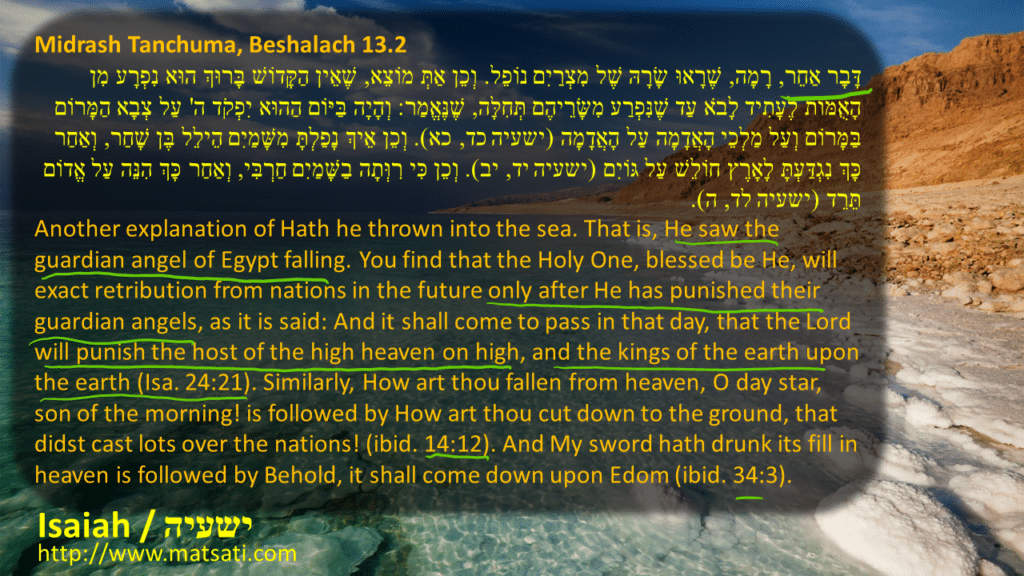
Midrash Tanchuma, Beshalach 13.2
דָּבָר אַחֵר, רָמָה, שֶׁרָאוּ שָׂרָהּ שֶׁל מִצְרַיִם נוֹפֵל. וְכֵן אַתְּ מוֹצֵא, שֶׁאֵין הַקָּדוֹשׁ בָּרוּךְ הוּא נִפְרָע מִן הָאֻמּוֹת לֶעָתִיד לָבֹא עַד שֶׁנִּפְרַע מִשָּׂרֵיהֶם תְּחִלָּה, שֶׁנֶּאֱמַר: וְהָיָה בַּיּוֹם הַהוּא יִפְקֹד ה’ עַל צְבָא הַמָּרוֹם בַּמָּרוֹם וְעַל מַלְכֵי הָאֲדָמָה עַל הָאֲדָמָה (ישעיה כד, כא). וְכֵן אֵיךְ נָפַלְתָּ מִשָּׁמַיִם הֵילֵל בֶּן שָׁחַר, וְאַחַר כָּךְ נִגְדַּעְתָּ לָאָרֶץ חוֹלֵשׁ עַל גּוֹיִם (ישעיה יד, יב). וְכֵן כִּי רִוְּתָה בַשָּׁמַיִם חַרְבִּי, וְאַחַר כָּךְ הִנֵּה עַל אֱדוֹם תֵּרֵד (ישעיה לד, ה).
Another explanation of Hath he thrown into the sea. That is, He saw the guardian angel of Egypt falling. You find that the Holy One, blessed be He, will exact retribution from nations in the future only after He has punished their guardian angels, as it is said: And it shall come to pass in that day, that the Lord will punish the host of the high heaven on high, and the kings of the earth upon the earth (Isa. 24:21). Similarly, How art thou fallen from heaven, O day star, son of the morning! is followed by How art thou cut down to the ground, that didst cast lots over the nations! (ibid. 14:12). And My sword hath drunk its fill in heaven is followed by Behold, it shall come down upon Edom (ibid. 34:3).
The armies that come against Judah and Jerusalem, these mighty men will be destroyed as fast as God will destroy their guardian angels. The Midrash speaks to the great fall of the host of heaven. This is analogized to the pride of kings, men, and women. There is no hope for those who walk in their pride. They will be destroyed going down to the grave because the Lord wills it. The mighty ones are not mighty at the hand of God. And the Lord will take care of those who are in need.
ספר ישעיה פרק יד
לא הֵילִילִי שַׁעַר זַעֲקִי-עִיר נָמוֹג פְּלֶשֶׁת כֻּלֵּךְ כִּי מִצָּפוֹן עָשָׁן בָּא וְאֵין בּוֹדֵד בְּמוֹעָדָיו: לב וּמַה-יַּעֲנֶה מַלְאֲכֵי-גוֹי כִּי יְהֹוָה יִסַּד צִיּוֹן וּבָהּ יֶחֱסוּ עֲנִיֵּי עַמּוֹ:
Isaiah 14:31 states, “Howl, O gate; cry, O city; thou, whole Palestina, art dissolved: (הֵילִילִי שַׁעַר זַעֲקִי-עִיר נָמוֹג פְּלֶשֶׁת כֻּלֵּךְ) for there shall come from the north a smoke, and none shall be alone in his appointed times. (כִּי מִצָּפוֹן עָשָׁן בָּא וְאֵין בּוֹדֵד בְּמוֹעָדָיו)” Isaiah 14:32 “What shall one then answer the messengers of the nation? (וּמַה-יַּעֲנֶה מַלְאֲכֵי-גוֹי) That the LORD hath founded Zion, and the poor of his people shall trust in it. (כִּי יְהֹוָה יִסַּד צִיּוֹן וּבָהּ יֶחֱסוּ עֲנִיֵּי עַמּוֹ)” Note that the Philistines do not exist today as a people. This prophecy is of the ultimate destruction of פְּלֶשֶׁת “Philistia” where smoke, the smoke of their destruction illustrates their final downfall. The smoke from the north (מִצָּפוֹן עָשָׁן בָּא) may be suggestive of the army that comes from the north (Assyria) and their destruction as they make their way through the Land of Israel in the north, to the southern regions (Judah and Jerusalem). Remember the pride of Assyria in Isaiah 5:27-28 in their ability to make war, in their weapons of war. Isaiah asks the question, וּמַה-יַּעֲנֶה מַלְאֲכֵי-גוֹי “And what shall one then answer the messengers of the nation?” suggesting that these messengers are coming to make an alliance with Judah and Jerusalem. The idea is that again of trusting in man as opposed to trusting in God. The proper answer is that the Lord God of Israel is in whom we should trust! The Philistines are also under the judgment of God at the hand of the Assyrian army due to their sin, just as Judah and Jerusalem are. The only solution to the destruction is to humble ourselves, repent, and turn from our sins! This is a difficult approach for those who are proud and refuse to listen to the voice of God. We remember this interesting principle that Yeshua taught us according to Luke 9:24, “Whoever would save his life will lose it.” These words speak to exactly what is taking place in Isaiah’s text, to trust in the Lord and not in ourselves. We are told the kind of people that we are according to 1 Peter 2:4-10.
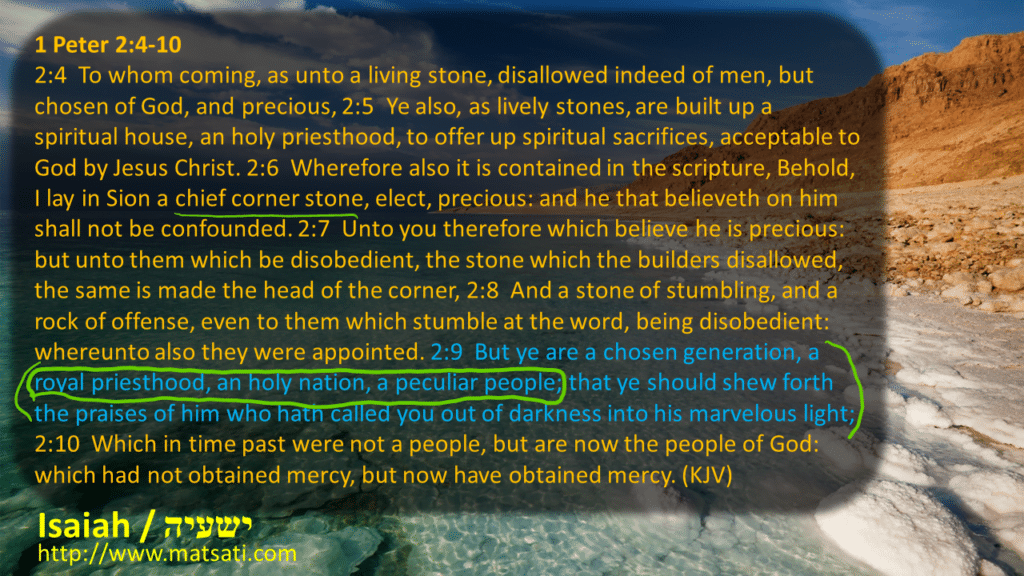
1 Peter 2:4-10
2:4 To whom coming, as unto a living stone, disallowed indeed of men, but chosen of God, and precious, 2:5 Ye also, as lively stones, are built up a spiritual house, an holy priesthood, to offer up spiritual sacrifices, acceptable to God by Jesus Christ. 2:6 Wherefore also it is contained in the scripture, Behold, I lay in Sion a chief corner stone, elect, precious: and he that believeth on him shall not be confounded. 2:7 Unto you therefore which believe he is precious: but unto them which be disobedient, the stone which the builders disallowed, the same is made the head of the corner, 2:8 And a stone of stumbling, and a rock of offense, even to them which stumble at the word, being disobedient: whereunto also they were appointed. 2:9 But ye are a chosen generation, a royal priesthood, an holy nation, a peculiar people; that ye should shew forth the praises of him who hath called you out of darkness into his marvelous light; 2:10 Which in time past were not a people, but are now the people of God: which had not obtained mercy, but now have obtained mercy. (KJV)
Note the specialty of who we are in the Messiah. The one who pursues the Lord God in heaven, and His Messiah Yeshua, will be precious people who show forth the glory of God. Peter quotes the Torah saying, 2:9 But ye are a chosen generation, a royal priesthood, an holy nation, a peculiar people… We have been called out of the darkness and into the light, into the righteousness and holiness of God. For those who trust in the Lord and who are dependent upon God, this person, this nation, is truly secure no matter what happens! These things teach us that a man can do nothing to redeem himself. With God being creator over all, what man is able to pay the price for his own salvation? It is through the holy one whom God has sent to save us that this is possible, by faith in the Messiah Yeshua. The proof of our faith is our remaining faithful to the Lord God in heaven, to listen to His voice, to walk in His commands, and to love one another as Yeshua had taught us to do, laying our lives down one for another!
Rabbinic Literature on Isaiah 14:22-32
The Targum Jonathan is an Aramaic translation of the book of Isaiah. This translation contains a rabbinic interpretation of Isaiah and is an important text to consider in our study on Isaiah.
תרגום יונתן בן עוזיאל אל ישעיה פרק יד:כב-לב
כב וְאַתגְלֵי לְאִתפְרָעָא מִנְהֹון אְמַר יוי צְבָאֹות וַאְשֵיצֵי לְבָבַל שוּם וּשאָר וּבַר וּבַר בַר אְמַר יוי׃ כג וַאְשַוֵינַה לִירוּתַת קוּפדִין בֵית צָדוּ בִיצִין דְמַיִין וַאְהָמְמִנַה כְמָא דִמהָמְמִין בִמבִינָא וַאְתָבְבִינַה לְשֵיצָאָה אְמַר יוי צְבָאֹות׃ כד קַיֵים יוי צְבָאֹות לְמֵימַר אִם לָא כְמָא דְחַשֵיבִית כֵין תְהֵי וּכמָא דִיעַצִית הִיא תְקוּם׃ כה לְמִתבַר אַתוּרָאָה בְאַרעִי וְעַל טוּרֵי עַמִי אְדֹושְשִינֵיה וְתִעדֵי מִנְהֹון מַרוְתֵיה וְנִירֵיה מֵעַל צַורֵיהֹון יִתפְסֵיק׃ כו דֵין מִלכָא דִמלִיך עַל כָל אַרעָא וְדָא גְבוּרְתָא דִמרָמְמָא דְשַלִיט עַל כָל מַלכְוָתָא׃ כז אַרֵי יוי צְבָאֹות מְלַך וּמַן יַעדֵי וּגבוּרְתֵיה מְרָמְמָא וְלֵית דִיתִיבִינַה׃ כח בְשַתָא דְמִית מַלכָא אָחָז הְוָה מַטַל נְבוּאְתָא הָדָא׃ כט לָא תִחדֹון פְלִשתָאֵי כוּלְכֹון אְרֵי אִיתְבַר שִלטֹון דַהְוָה מַפלַח בְכֹון אְרֵי מִבְנֵי בְנֹוהִי דְיִשַי יִפֹוק מְשִיחָא וִיהֹון עֹובָדֹוהִי בְכֹון כְחִיוֵי מַפרִית׃ ל וְיִתפַרנְסוּן חַשִיכֵי עַמָא וְעִנוְתָנַיָא בְיֹומֹוהִי לְרֻחצָן יִשרֹון וִימיִת בְכַפנָא בְנַך וּשאָר עַמִיך יְקַטֵיל׃ לא אֵילִילִי עַל תַרעַך צְוַחִי עַל קִרוַך אִיתְבַרתוּן פְלִשתָאֵי כוּלְכֹון אְרֵי מִצִיפוּנָא פֹורעָנָא אָתֵי וְלֵית דִמאַחַר בִמזָמְנֹוהִי לב וּמָא יְבַסְרוּן אִזגַדֵי עַמְמַיָא אְרֵי יוי שַכלְלַה לְצִיֹון וּבַה יִתרַחְצוּן וְיִחדֹון חַשִיכֵי עַמָא׃
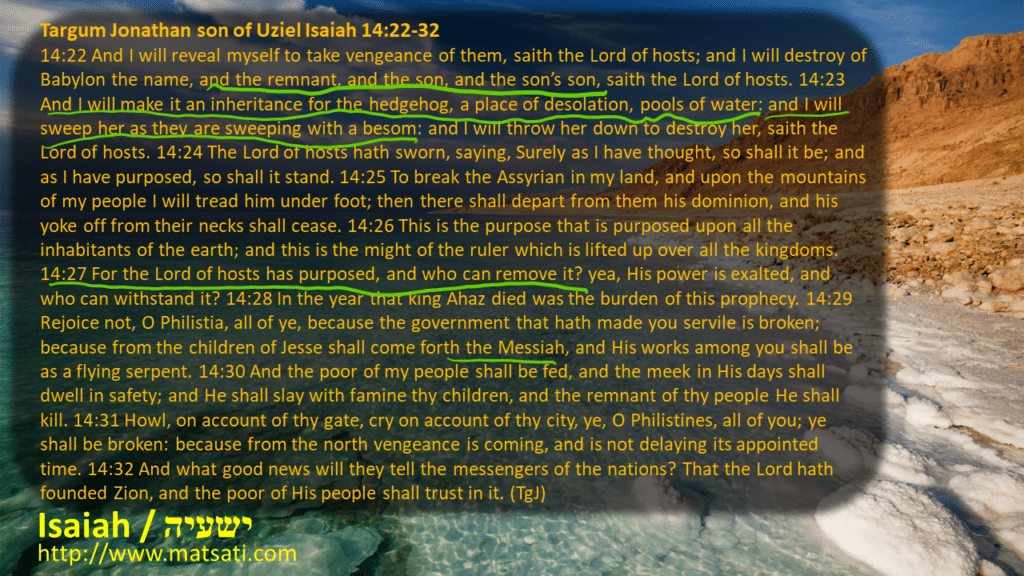
Targum Jonathan son of Uziel Isaiah 14:22-32
14:22 And I will reveal myself to take vengeance of them, saith the Lord of hosts; and I will destroy of Babylon the name, and the remnant, and the son, and the son’s son, saith the Lord of hosts. 14:23 And I will make it an inheritance for the hedgehog, a place of desolation, pools of water: and I will sweep her as they are sweeping with a besom: and I will throw her down to destroy her, saith the Lord of hosts. 14:24 The Lord of hosts hath sworn, saying, Surely as I have thought, so shall it be; and as I have purposed, so shall it stand. 14:25 To break the Assyrian in my land, and upon the mountains of my people I will tread him under foot; then there shall depart from them his dominion, and his yoke off from their necks shall cease. 14:26 This is the purpose that is purposed upon all the inhabitants of the earth; and this is the might of the ruler which is lifted up over all the kingdoms. 14:27 For the Lord of hosts has purposed, and who can remove it? yea, His power is exalted, and who can withstand it? 14:28 In the year that king Ahaz died was the burden of this prophecy. 14:29 Rejoice not, O Philistia, all of ye, because the government that hath made you servile is broken; because from the children of Jesse shall come forth the Messiah, and His works among you shall be as a flying serpent. 14:30 And the poor of my people shall be fed, and the meek in His days shall dwell in safety; and He shall slay with famine thy children, and the remnant of thy people He shall kill. 14:31 Howl, on account of thy gate, cry on account of thy city, ye, O Philistines, all of you; ye shall be broken: because from the north vengeance is coming, and is not delaying its appointed time. 14:32 And what good news will they tell the messengers of the nations? That the Lord hath founded Zion, and the poor of His people shall trust in it. (TgJ)
The Targum opens on Isaiah 14:22 saying the Lord will reveal himself before taking vengeance. Note how with the revelation of God comes a couple responses. One either responds in repentance, or one responds in rebellion and unbelief which is due to pride, arrogance, and this sense of superiority because men do not like to humble themselves. It is because of this pride that we read what we do according to the TgJ, כב וְאַתגְלֵי לְאִתפְרָעָא מִנְהֹון אְמַר יוי צְבָאֹות וַאְשֵיצֵי לְבָבַל שוּם וּשאָר וּבַר וּבַר בַר אְמַר יוי׃ 14:22 And I will reveal myself to take vengeance of them, saith the Lord of hosts; and I will destroy of Babylon the name, and the remnant, and the son, and the son’s son, saith the Lord of hosts. (TgJ) Here the Lord God will exact judgment upon the nation due to her sins, her idolatry, and her brutality towards God’s people. The TgJ describes the multigenerational destruction that is coming, and as we know today, Babylon lies in waste, a desert place, nothing exists in this region any longer in the Iraqi desert. Midrash Tanchuma Nitzavim 1.1 states the following concerning this verse.
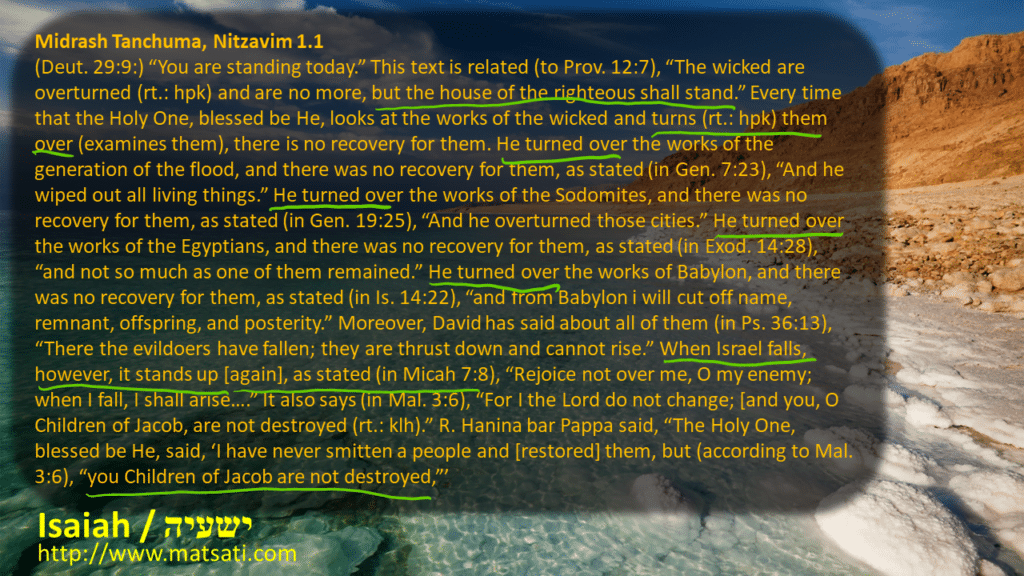
Midrash Tanchuma, Nitzavim 1.1
אַתֶּם נִצָּבִים הַיּוֹם. זֶה שֶׁאָמַר הַכָּתוּב: הָפוֹךְ רְשָׁעִים וְאֵינָם, וּבֵית צַדִּיקִים יַעֲמֹד (משלי יב, ז). כָּל זְמַן שֶׁהַקָּדוֹשׁ בָּרוּךְ הוּא מִסְתַּכֵּל בְּמַעֲשֵׂיהֶם שֶׁל רְשָׁעִים וּמְהַפֵּךְ בָּהֶם, אֵין לָהֶם תְּקוּמָה. הָפַךְ בְּמַעֲשֵׂיהֶם שֶׁל דּוֹר הַמַּבּוּל, לֹא הָיְתָה לָהֶם תְּקוּמָה, שֶׁנֶּאֱמַר: וַיִּמַּח אֶת כָּל הַיְקוּם (בראשית ז, כג). הָפַךְ בְּמַעֲשֵׂיהֶם שֶׁל אַנְשֵׁי סְדוֹם, וְלֹא הָיְתָה בָהֶן תְּקוּמָה, שֶׁנֶּאֱמַר: וַיַּהֲפֹךְ אֶת הֶעָרִים הָאֵל (שם יט, כה). הָפַךְ בְּמַעֲשֵׂיהֶם שֶׁל מִצְרִים, וְלֹא הָיְתָה לָהֶן תְּקוּמָה, שֶׁנֶּאֱמַר: לֹא נִשְׁאַר בָּהֶם עַד אֶחָד (שמות יד, כח). הָפַךְ בַּמַּעֲשֶׂה שֶׁל בָּבֶל וְלֹא הָיְתָה לָהּ תְּקוּמָה, שֶׁנֶּאֱמַר: וְהִכְרַתִּי לְבָבֶל שֵׁם וּשְׁאָר וְנִין וָנֶכֶד (ישעיה יד, כב). וְעַל כֻּלָּם אָמַר דָּוִד, שָׁם נָפְלוּ פּוֹעֲלֵי אָוֶן וְגוֹ’ (תהלים לו, יג). אֲבָל יִשְׂרָאֵל, נוֹפְלִין וְעוֹמְדִין. וְכֵן הוּא אוֹמֵר, אַל תִּשְׂמְחִי אוֹיַבְתִּי לִי כִּי נָפַלְתִּי קָמְתִּי וְגוֹ’ (מיכה ז, ח). כִּי אֲנִי ה’ לֹא שָׁנִיתִי וְגוֹ’ (מלאכי ג, ו), אָמַר רַבִּי חֲנִינָא בַּר פַּפָּא, אָמַר הַקָּדוֹשׁ בָּרוּךְ הוּא, מֵעוֹלָם לֹא הִכֵּיתִי אֻמָּה וְשָׁנִיתִי לָהּ. אֲבָל אַתֶּם בְּנֵי יַעֲקֹב לֹא כְלִיתֶם (מלאכי ג, ו), שֶׁנֶּאֱמַר: חִצַּי אֲכַלֶּה בָּם (דברים לב, כג), חִצַּי כָּלִין וְהֵן אֵינָן כָּלִים. וְכָךְ אָמְרָה כְּנֶסֶת יִשְׂרָאֵל, דָּרַךְ קַשְׁתּוֹ וַיַּצִּיבֵנִי וְגוֹ’ (איכה ג, יב). מָשָׁל לְמָה הַדָּבָר דּוֹמֶה, לְגִבּוֹר שֶׁהֶעֱמִיד אֶת הַקּוֹרָה וְהָיָה זוֹרֵק בּוֹ אֶת הַחִצִּים. חִצָּיו כָּלִין וְהַקּוֹרָה בִּמְקוֹמָהּ עוֹמֶדֶת. אַף יִשְׂרָאֵל כָּל זְמַן שֶׁהַיִּסּוּרִין בָּאִין עֲלֵיהֶן, הַיִּסּוּרִין כָּלִין וְהֵם בִּמְקוֹמָן עוֹמְדִין וְאֵינָן כָּלִין. לְכָךְ נֶאֱמַר: הָפוֹךְ רְשָׁעִים וְאֵינָם. אָמַר חִזְקִיָּה בְּנוֹ שֶׁל רַבִּי חִיָּא, לָמָּה נִסְמְכָה פָּרָשָׁה זוֹ לְפָרָשַׁת קְלָלוֹת. לְפִי שֶׁשָּׁמְעוּ יִשְׂרָאֵל מֵאָה קְלָלוֹת חָסֵר שְׁתַּיִם שֶׁנֶּאֶמְרוּ בְּפָרָשָׁה זוֹ חוּץ מֵאַרְבָּעִים וְתֵשַׁע שֶׁנֶּאֶמְרוּ בְּתוֹרַת כֹּהֲנִים, מִיָּד הוֹרִיקוּ פְּנֵיהֶם וְאָמְרוּ, מִי יָכוֹל לַעֲמֹד בְּאֵלּוּ. מִיָּד קָרָא אוֹתָן מֹשֶׁה וְהָיָה מְפַיְּסָן. מַה כְּתִיב לְמַעְלָה מִן הָעִנְיָן, וַיִּקְרָא מֹשֶׁה אֶל כָּל יִשְׂרָאֵל וְגוֹ’, הַמַּסּוֹת הַגְּדוֹלוֹת וְגוֹ’, וַתָּבֹאוּ אֶל הַמָּקוֹם הַזֶּה וְגוֹ’. וְאַתֶּם לֹא שְׁמַעְתֶּם בְּקוֹלִי וַאֲמַרְתֶּם לְפָנַי דְּבָרִים שֶׁאַתֶּם חַיָּבִין עֲלֵיהֶם כְּלָיָה וְלֹא עָשִׂיתִי אֶתְכֶם כְּלָיָה, שֶׁנֶּאֱמַר: אֲבוֹתֵינוּ בְּמִצְרַיִם לֹא הִשְׂכִּילוּ נִפְלְאוֹתֶיךָ וְגוֹ’ (תהלים קו, ז). וְלֹא עוֹד אֶלָּא שֶׁאֲמַרְתֶּם לָעֵגֶל, אֵלֶּה אֱלֹהֶיךָ יִשְׂרָאֵל (שמות לב, ד). וְאִם תֹּאמַר מִפְּנֵי מָה הַגּוֹיִם נִתְחַיְּבוּ כְּלָיָה וְאָנוּ קַיָּמִין. לְפִי שֶׁבְּשָׁעָה שֶׁבָּאוּ עֲלֵיהֶן יִסּוּרִין, מְבַעֲטִים בָּהֶן וְאֵינָם מַזְכִּירִין שְׁמוֹ שֶׁל הַקָּדוֹשׁ בָּרוּךְ הוּא, שֶׁנֶּאֱמַר: שְׁפֹךְ חֲמָתְךָ עַל הַגּוֹיִם אֲשֶׁר לֹא יְדָעוּךָ וְגוֹ’ (תהלים עט, ו). אֲבָל יִשְׂרָאֵל, כְּשֶׁהַיִּסּוּרִין בָּאִין עֲלֵיהֶן, הֵן נִכְנָעִין וּמִתְפַּלְּלִין, שֶׁנֶּאֱמַר: צָרָה וְיָגוֹן אֶמְצָא וְגוֹ’ (שם קטז, ג-ד). לְפִיכָךְ אָמַר לָהֶם הַקָּדוֹשׁ בָּרוּךְ הוּא, אַף עַל פִּי שֶׁקְּלָלוֹת הַלָּלוּ בָּאוֹת עֲלֵיכֶם, הֵן מַעֲמִידוֹת אֶתְכֶם. וְכֵן הוּא אוֹמֵר, לְמַעַן עַנֹּתְךָ וּלְמַעַן נַסֹּתֶךָ וְגוֹ’ (דברים ח, טז). וְכָךְ אָמַר לָהֶם מֹשֶׁה לְיִשְׂרָאֵל, אַף עַל פִּי שֶׁהַיִּסּוּרִין הַלָּלוּ בָּאִין עֲלֵיכֶם, יֵשׁ לָכֶם עֲמִידָה. לְכָךְ נֶאֱמַר: אַתֶּם נִצָּבִים הַיּוֹם כֻּלְּכֶם. דָּבָר אַחֵר, מִפְּנֵי מָה עֲשָׂאָן מֹשֶׁה מַצֵּבָה. מִפְּנֵי שֶׁמִּשְׁתַּמְּשִׁין מִדַּעַת לְדַעַת. מִדַּעַת מֹשֶׁה לְדַעַת יְהוֹשֻׁעַ. מִדַּעַת יְהוֹשֻׁעַ לְדַעַת הַזְּקֵנִים. וְאַף יְהוֹשֻׁעַ עֲשָׂאָן מַצֵּבָה, שֶׁנֶּאֱמַר: וַיֶּאֱסֹף יְהוֹשֻׁעַ אֶת כָּל זִקְנֵי יִשְׂרָאֵל שְׁכֶמָה וְגוֹ’ (יהושע כד, א). וְאַף שְׁמוּאֵל שֶׁמִּשְׁתַּמְּשִׁין מִדַּעְתּוֹ לְדַעַת מְלָכִים, עֲשָׂאָן מַצֵּבָה, שֶׁנֶּאֱמַר: וְעַתָּה הִתְיַצְּבוּ וְאֶשְׁפְּטָהּ אֶתְכֶם (ש״א יב, ז). דָּבָר אַחֵר, אַתֶּם נִצָּבִים הַיּוֹם, מָה הַיּוֹם מֵאִיר פְּעָמִים וּמַאֲפִיל פְּעָמִים, אַף אַתֶּם כְּשֶׁאֲפֵלָה לָכֶם, עָתִיד לְהָאִיר לָכֶם אוֹר עוֹלָם, שֶׁנֶּאֱמַר: וְהָיָה לְךָ ה’ לְאוֹר עוֹלָם (ישעיה ס, יט). אֵימָתַי, בִּזְמַן שֶׁתִּהְיוּ כֻּלְּכֶם אֲגֻדָּה אַחַת, שֶׁנֶּאֱמַר: חַיִּים כֻּלְּכֶם הַיּוֹם (דברים ד, ד). בְּנֹהַג שֶׁבָּעוֹלָם, אִם נוֹטֵל אָדָם אֲגֻדָּה שֶׁל קָנִים, שֶׁמָּא יָכֹל לְשָׁבְרָם בְּבַת אַחַת. וְאִלּוּ נוֹטֵל אַחַת אַחַת, אֲפִלּוּ תִּינוֹק מְשַׁבְּרָן. וְכֵן אַתְּ מוֹצֵא שֶׁאֵין יִשְׂרָאֵל נִגְאֲלִין עַד שֶׁיִּהְיוּ כֻּלָּן אֲגֻדָּה אַחַת, שֶׁנֶּאֱמַר: בַּיָּמִים הָהֵמָּה וּבָעֵת הַהִיא נְאֻם ה’ יָבֹאוּ בְנֵי יִשְׂרָאֵל וּבְנֵי יְהוּדָה יַחְדָּו וְגוֹ’ (ירמיה נ, ד). כְּשֶׁהֵן אֲגוּדִים, מְקַבְּלִין פְּנֵי שְׁכִינָה.
(Deut. 29:9:) “You are standing today.” This text is related (to Prov. 12:7), “The wicked are overturned (rt.: hpk) and are no more, but the house of the righteous shall stand.” Every time that the Holy One, blessed be He, looks at the works of the wicked and turns (rt.: hpk) them over (examines them), there is no recovery for them. He turned over the works of the generation of the flood, and there was no recovery for them, as stated (in Gen. 7:23), “And he wiped out all living things.” He turned over the works of the Sodomites, and there was no recovery for them, as stated (in Gen. 19:25), “And he overturned those cities.” He turned over the works of the Egyptians, and there was no recovery for them, as stated (in Exod. 14:28), “and not so much as one of them remained.” He turned over the works of Babylon, and there was no recovery for them, as stated (in Is. 14:22), “and from Babylon i will cut off name, remnant, offspring, and posterity.” Moreover, David has said about all of them (in Ps. 36:13), “There the evildoers have fallen; they are thrust down and cannot rise.” When Israel falls, however, it stands up [again], as stated (in Micah 7:8), “Rejoice not over me, O my enemy; when I fall, I shall arise….” It also says (in Mal. 3:6), “For I the Lord do not change; [and you, O Children of Jacob, are not destroyed (rt.: klh).” R. Hanina bar Pappa said, “The Holy One, blessed be He, said, ‘I have never smitten a people and [restored] them, but (according to Mal. 3:6), “you Children of Jacob are not destroyed,”’ This is as stated (in Deut. 32:23), ‘I will use up (rt.: klh) My arrows on them,’ [meaning that] My arrows are used up (rt.: klh) but they are not destroyed (rt.: klh).” And so has the assembly of Israel said (in Lam. 3:12), “He has bent his bow; he has set me as a target for the arrow.” To what is the matter comparable? To a warrior who raises up the [target] post and shoots the arrows at them. The arrows are used up (rt.: klh), but the post stands. So it is also with Israel. Every time that afflictions came upon them, the afflictions ended, and they were standing in their place. Ergo it is stated (in Prov. 12:7), “The wicked are overturned and are no more.” Hezekiah the son of R. Hiyya said, “Why is this parashah next to the parashah about curses (i.e., Deut. 27:11-28:69)? Because Israel heard a hundred curses less two in this parashah, apart from the forty-nine which are uttered in the priestly Torah (i.e., in Leviticus). They immediately turned green in the face and said, ‘Who can withstand these [curses]?’ Moses called them immediately (in Deut. 29:1) and pacified them with [the words from Deut. 29:9].” What is written above the matter (in Deut. 29:1-2, 6)? “Then Moses summoned all of Israel [and said unto them, ‘You have seen all that the Lord did before your eyes in the land of Egypt,] …. The great trials [which your eyes saw, the signs, and those great wonders]. When you came unto this place, [Sihon king of Heshbon and Og king of Bashan came out to engage us in battle; but we defeated them].” And you did not heed My voice, and you uttered words before Me for which you deserved destruction. Still I did not wreak destruction upon you, when it is stated (in Ps. 106:7), “When our ancestors were in Egypt, they did not consider Your wondrous works….” And not only that, but they said of the calf (in Exod. 32:4), “This is your god, O Israel.” Now if you should say, “For what reason did the [other] nations deserve destruction, while we are remaining alive?” It is because when afflictions come upon them, they kick against them and do not mention the name of the Holy One, blessed be He, as stated (in Ps. 79:6), “Pour out your wrath upon the nations that have not known you, [upon the kingdoms that do not invoke Your name].” In the case of Israel, however, when afflictions come upon them, they make submit and pray, as stated (in Ps. 116:3-4), “I found trouble and sorrow, but I shall invoke the name of the Lord.” Therefore the Holy One, blessed be He, said, “Even though these maledictions come upon you, they [themselves] stand you up; and so it says (in Deut. 8:16), ‘in order to humble you and in order to test you, [so as to benefit you in the end].’” Thus did Moses say to Israel, “Even though afflictions come upon you, you have a standing.” It is therefore stated (in Deut. 29:9), “You are standing today, all of you.” Another interpretation (of Deut. 29:9), “You are standing (nizavim) today”: Why did Moshe make them into a pillar (mazevah)? Because they would [change] from one opinion to another opinion: from the opinion of Moshe to the opinion of Joshua; from the opinion of Joshua to the opinion of the elders. And Joshua also made them into a pillar, as stated (in Josh. 24:1), “Joshua assembled all the tribes of Israel at Schechem, [and he summoned Israel’s elders and commanders, magistrates and officers; and they presented (yityazvu) themselves].” And Samuel – since they [changed] from his opinion to the opinion of the kings – also made them into a pillar, as stated (in I Sam. 12:7), “And now stand (hityazvu) and I will judge you.” Another interpretation (of Deut. 29:9), “You are standing today”: Just as today (literally: the day) sometimes darkens and sometimes lightens, so it is with you. Although you have darkness, the Holy One, blessed be He, is going to shine on you with light eternal, as stated (in Is. 60:19), “for the Lord shall be your everlasting light.” When? When you all become one group, as stated (in Deut. 4:4), “are all alive today.” According to universal custom, if one takes a group of reeds, will he be able to break them at one stroke! But if he takes them one by one, even an infant can break them. So also you find that Israel was not redeemed until they became one group, as stated (in Jer. 50:4), “’In those days and at that time,’ says the Lord,’ the children of Israel, they and the children of Judah, shall come together.’” When they are united, they shall welcome the face of the Divine Presence.
The Midrash begins with a list of the various times that God had overturned the wicked and reiterates that the house of the righteous will stand, while the house of the wicked will fall. Examples given, the generation of the flood (Bereshit / Genesis 7:23), the sodomites of Sodom and Gomorrah (Bereshit / Genesis 19:25), the Egyptians (Shemot / Exodus 14:28), and Babylon (Isaiah 14:22). When the Lord strikes the wicked, they are overturned and they are no more. When God’s people are struck, chastised, they turn over and are raised up, those who would repent and turn from their sins. The Midrash states, “you did not heed My voice, and you uttered words before Me for which you deserved destruction. Still I did not wreak destruction upon you, when it is stated (in Ps. 106:7), ‘When our ancestors were in Egypt, they did not consider Your wondrous works….’ And not only that, but they said of the calf (in Exod. 32:4),” this speaks to the mercy of God towards His people. How often do we utter words of destruction, or even what we have in our thought life? Both the Rabbinic literature and the Scriptures provide us with reasons to repent, this isn’t something that is one sided only. The Lord God has demonstrated His great mercy to us, and He does so over and over again and so this reveals how the Lord takes the first steps, we are to then to walk in like manner, to humble ourselves, to repent, and to turn from our sins. We note how God works in our lives according to the Midrash, “Even though these maledictions come upon you, they [themselves] stand you up; and so it says (in Deut. 8:16), ‘in order to humble you and in order to test you, [so as to benefit you in the end].’” Thus did Moses say to Israel, “Even though afflictions come upon you, you have a standing.” The Midrash describes the reason events happen in the way that they do, just as the Torah describes, is for our humbling. We are also told that God tests us to see whether we will remain faithful and so that we continue to trust in the Lord God in heaven, and not in ourselves! Note the timelessness of Isaiah’s words for us today as we read according to Isaiah 1-14!
The TgJ continues saying the following, כג וַאְשַוֵינַה לִירוּתַת קוּפדִין בֵית צָדוּ בִיצִין דְמַיִין וַאְהָמְמִנַה כְמָא דִמהָמְמִין בִמבִינָא וַאְתָבְבִינַה לְשֵיצָאָה אְמַר יוי צְבָאֹות׃ 14:23 And I will make it an inheritance for the hedgehog, a place of desolation, pools of water: and I will sweep her as they are sweeping with a besom: and I will throw her down to destroy her, saith the Lord of hosts. כד קַיֵים יוי צְבָאֹות לְמֵימַר אִם לָא כְמָא דְחַשֵיבִית כֵין תְהֵי וּכמָא דִיעַצִית הִיא תְקוּם׃ 14:24 The Lord of hosts hath sworn, saying, Surely as I have thought, so shall it be; and as I have purposed, so shall it stand. ה לְמִתבַר אַתוּרָאָה בְאַרעִי וְעַל טוּרֵי עַמִי אְדֹושְשִינֵיה וְתִעדֵי מִנְהֹון מַרוְתֵיה וְנִירֵיה מֵעַל צַורֵיהֹון יִתפְסֵיק׃ 14:25 To break the Assyrian in my land, and upon the mountains of my people I will tread him under foot; then there shall depart from them his dominion, and his yoke off from their necks shall cease. כו דֵין מִלכָא דִמלִיך עַל כָל אַרעָא וְדָא גְבוּרְתָא דִמרָמְמָא דְשַלִיט עַל כָל מַלכְוָתָא׃ 14:26 This is the purpose that is purposed upon all the inhabitants of the earth; and this is the might of the ruler which is lifted up over all the kingdoms. כז אַרֵי יוי צְבָאֹות מְלַך וּמַן יַעדֵי וּגבוּרְתֵיה מְרָמְמָא וְלֵית דִיתִיבִינַה׃ 14:27 For the Lord of hosts has purposed, and who can remove it? yea, His power is exalted, and who can withstand it? כח בְשַתָא דְמִית מַלכָא אָחָז הְוָה מַטַל נְבוּאְתָא הָדָא׃ 14:28 In the year that king Ahaz died was the burden of this prophecy. כט לָא תִחדֹון פְלִשתָאֵי כוּלְכֹון אְרֵי אִיתְבַר שִלטֹון דַהְוָה מַפלַח בְכֹון אְרֵי מִבְנֵי בְנֹוהִי דְיִשַי יִפֹוק מְשִיחָא וִיהֹון עֹובָדֹוהִי בְכֹון כְחִיוֵי מַפרִית׃ 14:29 Rejoice not, O Philistia, all of ye, because the government that hath made you servile is broken; because from the children of Jesse shall come forth the Messiah, and His works among you shall be as a flying serpent. (TgJ) The basic concepts here are the Lord will make Babylon desolate in her destruction. Assyria will be destroyed from Israel, and the Lord will free His people from their awful yoke. The reason these things will happen are so that all the earth will know that the God of Israel is mighty, high, and lifted up above all the kingdoms of the earth (Isaiah 14:26). The TgJ speaks of the utter destruction of Babylon, it will be a place for animals, a place that is utterly swept away. Assyria is included in this prophetic word according to the targum, as God removes the dominion of Assyria from off the backs of His people. (14:25-26) The TgJ also speaks of the Messianic king (Isaiah 14:29) as coming from the children of Jesse to deliver. He says that His works will be like the flying serpent. The idea here appears to be an allusion to something spiritual taking place. The Work of the Messiah will spiritually affect the people for righteousness and holiness. Again note the NT parallels to this mode of thought in the idea of the Messiah empowering the believers to be overcomers, conquerors, priests and kings, etc. The Zohar connects these things to the spiritual aspect of the Kabbalistic Tree of Life.
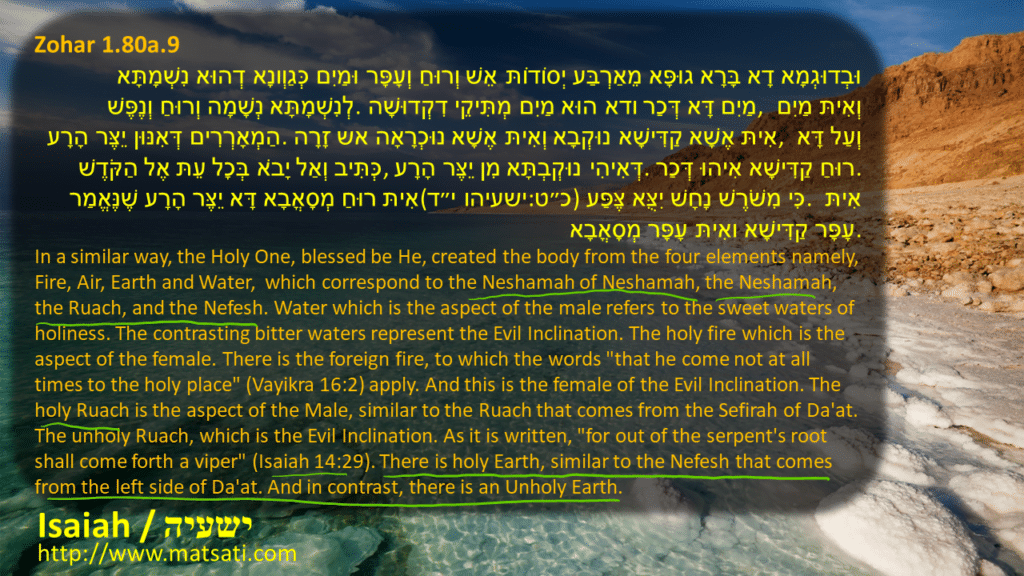
Zohar 1.80a.9
וּבְדוּגְמָא דָא בָּרָא גוּפָּא מֵאַרְבַּע יְסוֹדוֹתּ אֵשׁ וְרוּחַ וְעָפָּר וּמַיִם כְּגַוְונָא דְהוּא נִשְׁמָתָּא לְנִשְׁמָתָּא נְשָׁמָה וְרוּחַ וְנֶפֶּשׁ. מַיִם דָּא דְּכַר ודא הוּא מַיִם מְתִּיקֵי דִקְדוּשָׁה, וְאִיתּ מַיִם הַמְאָרְרִים דְּאִנּוּן יֵצֶּר הָרָע. אִיתּ אֶשָׁא קַדִּישָׁא נוּקְבָא וְאִיתּ אֶשָׁא נוּכְרָאָה אש זָרָה, וְעַל דָּא כְּתִּיב וְאַל יָבֹא בְּכָל עֵתּ אֶל הַקֹּדֶשׁ, דְּאִיהִי נוּקְבְתָּא מִן יֵצֶּר הָרָע. רוּחַ קַדִּישָׁא אִיהוּ דְּכַר. אִיתּ רוּחַ מְסָאֳבָא דָּא יֵצֶּר הָרָע שֶׁנֶּאֱמַר (ישעיהו י״ד:כ״ט) כִּי מִשֹׁרֶשׁ נָחָשׁ יִצֻּא צֶּפַּע. אִיתּ עָפָּר קַדִּישָׁא ואִיתּ עָפָּר מְסָאֳבָא.
In a similar way, the Holy One, blessed be He, created the body from the four elements namely, Fire, Air, Earth and Water, which correspond to the Neshamah of Neshamah, the Neshamah, the Ruach, and the Nefesh. Water which is the aspect of the male refers to the sweet waters of holiness. The contrasting bitter waters represent the Evil Inclination. The holy fire which is the aspect of the female. There is the foreign fire, to which the words “that he come not at all times to the holy place” (Vayikra 16:2) apply. And this is the female of the Evil Inclination. The holy Ruach is the aspect of the Male, similar to the Ruach that comes from the Sefirah of Da’at. The unholy Ruach, which is the Evil Inclination. As it is written, “for out of the serpent’s root shall come forth a viper” (Isaiah 14:29). There is holy Earth, similar to the Nefesh that comes from the left side of Da’at. And in contrast, there is an Unholy Earth.
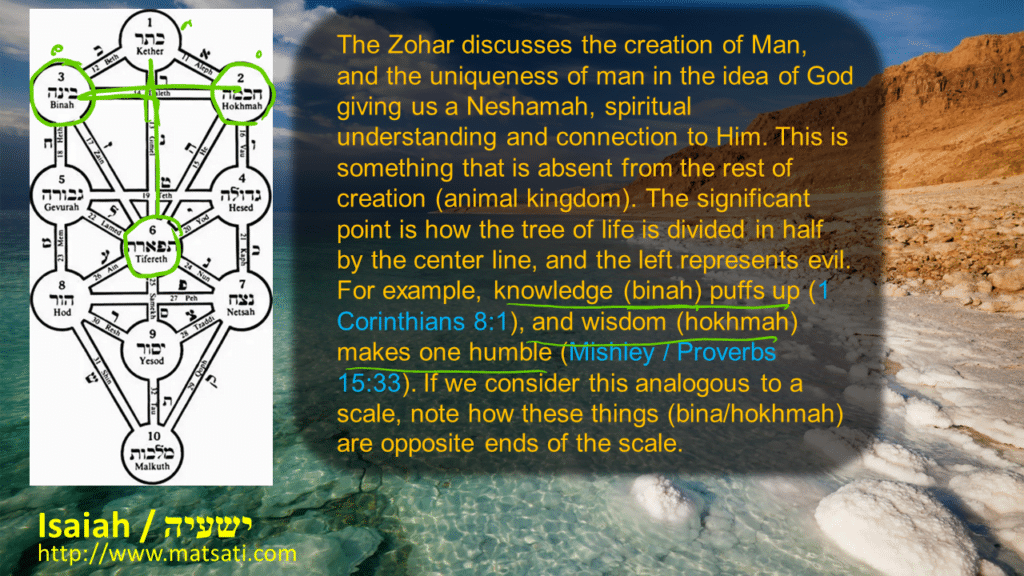
The Zohar discusses the creation of Man, and the uniqueness of man in the idea of God giving us a Neshamah, spiritual understanding and connection to Him. This is something that is absent from the rest of creation (animal kingdom). The significant point is how the tree of life is divided in half by the center line, and the left represents evil. For example, knowledge (binah) puffs up (1 Corinthians 8:1), and wisdom (hokhmah) makes one humble (Mishley / Proverbs 15:33). If we consider this analogous to a scale, note how these things (bina/hokhmah) are opposite ends of the scale. Remember these concepts from the NT text? Kabbalistically, Hell cleaves itself to the left and separates itself from the right. (For more discussion on this kabbalistic concept see: פרשת קרח, Parashat Korach, Bits of Torah Truths) Tifereth represents the Messiah who unites the two, brings peace and fellowship, and causes hell to descend, raising up the left, saving the left, and joining the left with the right, etc. These concepts are all very messianic in nature. The significant concepts provided here are how the Zohar describes a holy and unholy Ruach (Spirit). This is abstracted to the Yetzer hatov (good inclination), and the Yetzer harah (evil inclination), respectively. The spiritual aspect of holy and unholy, are manifested in the world through our actions, which are described as the holy earth and the unholy earth. These concepts all are very interesting as they illustrate the connection between the physical world and the spiritual world. While reading the dead sea scrolls (DSS) we find a significant number of discussions on Belial which provides us with a similar depth of understanding concerning the workings of the evil one in this world.
References to DSS Sectarian Documents on Belial
The writeup on the DSS in this section is the result of wonderful discussions and great thanks to a friend of mine – Richard
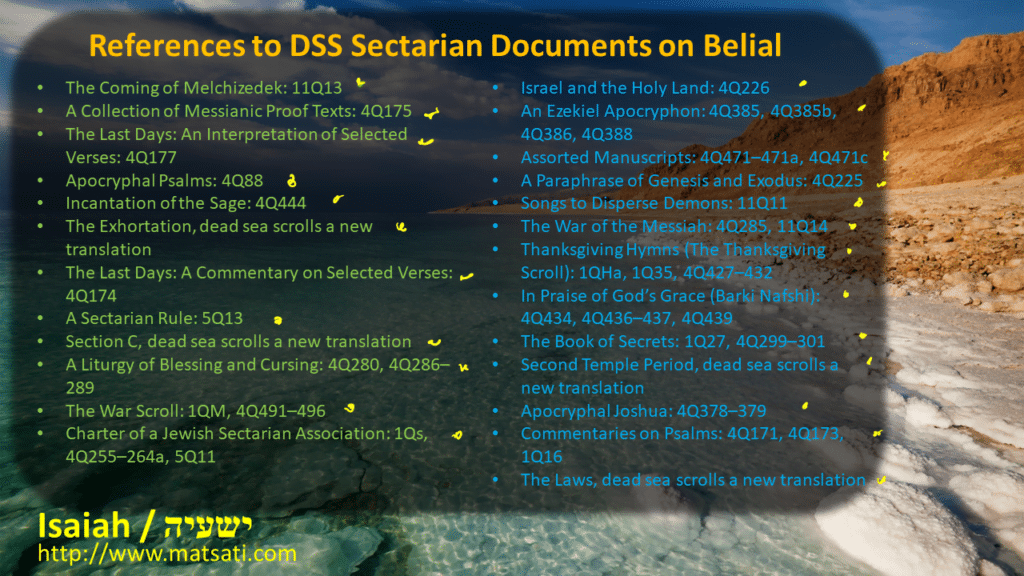
- The Coming of Melchizedek: 11Q13
- A Collection of Messianic Proof Texts: 4Q175
- The Last Days: An Interpretation of Selected Verses: 4Q177
- Apocryphal Psalms: 4Q88
- Incantation of the Sage: 4Q444
- The Exhortation, dead sea scrolls a new translation
- The Last Days: A Commentary on Selected Verses: 4Q174
- A Sectarian Rule: 5Q13
- Section C, dead sea scrolls a new translation
- A Liturgy of Blessing and Cursing: 4Q280, 4Q286–289
- The War Scroll: 1QM, 4Q491–496
- Charter of a Jewish Sectarian Association: 1Qs, 4Q255–264a, 5Q11
- Israel and the Holy Land: 4Q226
- An Ezekiel Apocryphon: 4Q385, 4Q385b, 4Q386, 4Q388
- Assorted Manuscripts: 4Q471–471a, 4Q471c
- A Paraphrase of Genesis and Exodus: 4Q225
- Songs to Disperse Demons: 11Q11
- The War of the Messiah: 4Q285, 11Q14
- Thanksgiving Hymns (The Thanksgiving Scroll): 1QHa, 1Q35, 4Q427–432
- In Praise of God’s Grace (Barki Nafshi): 4Q434, 4Q436–437, 4Q439
- The Book of Secrets: 1Q27, 4Q299–301
- Second Temple Period, dead sea scrolls a new translation
- Apocryphal Joshua: 4Q378–379
- Commentaries on Psalms: 4Q171, 4Q173, 1Q16
- The Laws, dead sea scrolls a new translation
Summary of discussions on Belial
The DSS connects the evil one (Satan) to Belial saying one day the earth will pass from Satan (Belial) to the righteous sons of light. (The Coming of Melchizedek: 11Q13) The cursed man belongs to Belial which refers to the wicked priest. (A Collection of Messianic Proof Texts: 4Q175) In the last days in general terms Belial will make an attempt to destroy the righteous. (Apocryphal Psalms: 4Q88) The dominion of Belial is the dominion of Satan. (Incantation of the Sage: 4Q444) This present age is under the power of Belial, that is Satan. (The Exhortation, dead sea scrolls a new translation) Belial is connected to spiritual beings. (The Last Days: A Commentary on Selected Verses: 4Q174) We are told to keep away from the counsel of Belial. (A Sectarian Rule: 5Q13) The curses upon Satan are called Belial and Melkiresha and his attendants are evil spirits. (Section C, dead sea scrolls a new translation) In the War Scroll, the great hand of God will overcome Belial and all the angels of his dominion. According to the Charter of Jewish Sectarian Association, we are living in an era when Satan (here called Belial) rules the world. Belial is connected to angelic beings according to “Israel and the Holy Land: 4Q226.” God preserves a remnant from the oppressions of Belial (4Q386, 1 Col. 2) Belial listens to the prince of Malevolence. Those who are possessed by demons are crushed by Belial. The Messiah, the branch of David, will judge all the forces of Belial. Deception and flattery are those men who sow deceit, their thoughts are the plots of Belial (Thanksgiving Hymns [The Thanksgiving Scroll]: 1QHa, 1Q35, 4Q427–432). Those who work evil, their schemes are that of Belial. God will protect us from the plots of Belial through our enemies (In Praise of God’s Grace (Barki Nafshi): 4Q434, 4Q436–437, 4Q439). The wisdom and cunning of evil are the schemes of Belial, things which ought not be done. (The Book of Secrets: 1Q27, 4Q299–301) The rule of Belial shall be over them so that they can be handed over for judgment. (Second Temple Period, dead sea scrolls a new translation) The cursed man belongs to Belial (Apocryphal Joshua: 4Q378–379). We are delivered from all of the snares of Belial (Commentaries on Psalms: 4Q171, 4Q173, 1Q16). And “everyone who is controlled by the spirits of Belial and who advises apostasy will receive the same verdict as the necromancer and the medium; but all who go astray to defile the Shabbat and the festivals shall not be put to death for it is the responsibility of human beings to keep him in custody.” (The Laws, dead sea scrolls a new translation)
An interesting point that we find while reading the NT text in conjunction with the DSS is the use of the hermeneutical technique known as gezeira shava. A gezeira shava is a tradition of a known rule applying to a new case based upon an identical word or phrase in both cases. An example may be taken from 2 Corinthians 6:15 when Paul writes “What harmony is there between Christ and Belial? Or what does a believer have in common with an unbeliever? What harmony can there be between Christ and the devil?” Another example may be taken from Ephesians 6.
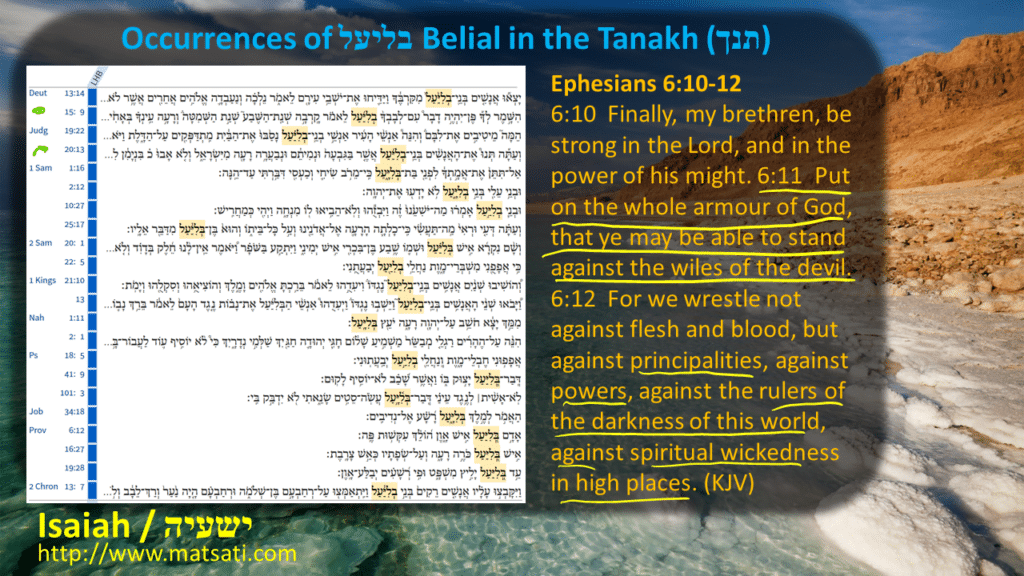
Ephesians 6:10-12
6:10 Finally, my brethren, be strong in the Lord, and in the power of his might. 6:11 Put on the whole armour of God, that ye may be able to stand against the wiles of the devil. 6:12 For we wrestle not against flesh and blood, but against principalities, against powers, against the rulers of the darkness of this world, against spiritual wickedness in high places. (KJV)
Using the system of Gezeira Shava we understand this as the power of Belial according to the DSS. Something to note about the word בְּלִיַּעַל Belial. The uses of this world occur in the following locations according to the Tanakh. A few observations, the sons of Belial are first mentioned according to Judges 19:22 and 20:13, while we see the use of the word Belial prior to this according to Devarim / Deuteronomy 13:14 and 15:9. The word בְּלִיַּעַל Belial looks like a compound word בלי + יעל meaning “without profit” and literally means “worthless one.” This is how the word is used in the Torah.
Due to the use of the word in the Tanakh, the worthless one became known as the works of the evil one. Using this hermeneutical technique Gezeira Shava, any system of lawlessness technically directs us to Belial. We note how the Zohar points to good versus bad with the example of the Yetzer hatov and harah. The NT Gezeira Shava usage also may be found in the Messiah versus the anti-messiah teachings. This anti-messiah is the spirit of Belial, the one who teaches apostasy. These observations in the text from the DSS, the Tanakh, and the NT, have great significance in the day and age that we live. Consider the modern theologies that teach against the Torah, that the Torah has ended (the Law has passed away). In the majority of Christianity today, the church has been sold a “Jesus” who is lawless saying that Jesus’ disciples do not need to keep God’s commands. This is huge in terms of prophecy concerning the last days, the DSS, and the Scriptures themselves. What we see today is a spirit of Belial that comes as a light, but not the true light. Paul wrote saying there will be those “Having a form of godliness but denying the power thereof from such turn away” (2 Timothy 3:5). Many years ago, I had concluded this is the outcome of those who believe in dispensationalism. This ties into the gifts of the Spirit, that those who teach of a Jesus who is anti-Torah, are doing so in a spirit of Belial, a false Jesus. The spirit that comes upon people who speak in tongues in the Pentecostal churches, the babbling that is being done, is the product of a different spirit. Like the Kundalini spirit that many have witnessed going on in congregations across the USA and the world. This is what Paul was warning us according to 2 Thessalonians 2:9.
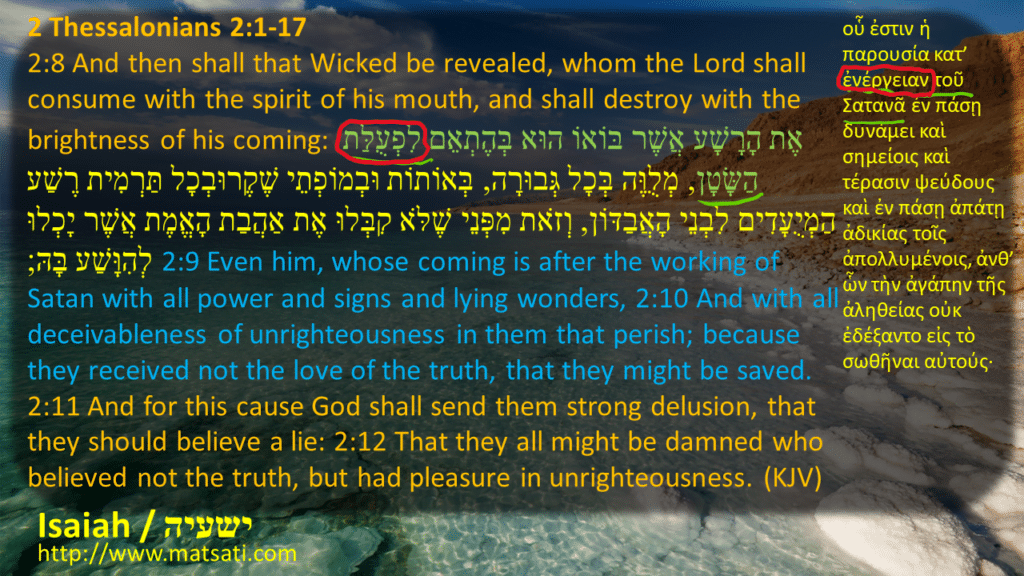
2 Thessalonians 2:1-17
2:1 Now we beseech you, brethren, by the coming of our Lord Jesus Christ, and by our gathering together unto him, 2:2 That ye be not soon shaken in mind, or be troubled, neither by spirit, nor by word, nor by letter as from us, as that the day of Christ is at hand. 2:3 Let no man deceive you by any means: for that day shall not come, except there come a falling away first, and that man of sin be revealed, the son of perdition; 2:4 Who opposeth and exalteth himself above all that is called God, or that is worshipped; so that he as God sitteth in the temple of God, shewing himself that he is God. 2:5 Remember ye not, that, when I was yet with you, I told you these things? 2:6 And now ye know what withholdeth that he might be revealed in his time. 2:7 For the mystery of iniquity doth already work: only he who now letteth will let, until he be taken out of the way. 2:8 And then shall that Wicked be revealed, whom the Lord shall consume with the spirit of his mouth, and shall destroy with the brightness of his coming: 2:9 Even him, whose coming is after the working of Satan with all power and signs and lying wonders, 2:10 And with all deceivableness of unrighteousness in them that perish; because they received not the love of the truth, that they might be saved. 2:11 And for this cause God shall send them strong delusion, that they should believe a lie: 2:12 That they all might be damned who believed not the truth, but had pleasure in unrighteousness. 2:13 But we are bound to give thanks alway to God for you, brethren beloved of the Lord, because God hath from the beginning chosen you to salvation through sanctification of the Spirit and belief of the truth: 2:14 Whereunto he called you by our gospel, to the obtaining of the glory of our Lord Jesus Christ. 2:15 Therefore, brethren, stand fast, and hold the traditions which ye have been taught, whether by word, or our epistle. 2:16 Now our Lord Jesus Christ himself, and God, even our Father, which hath loved us, and hath given us everlasting consolation and good hope through grace, 2:17 Comfort your hearts, and stablish you in every good word and work. (KJV)
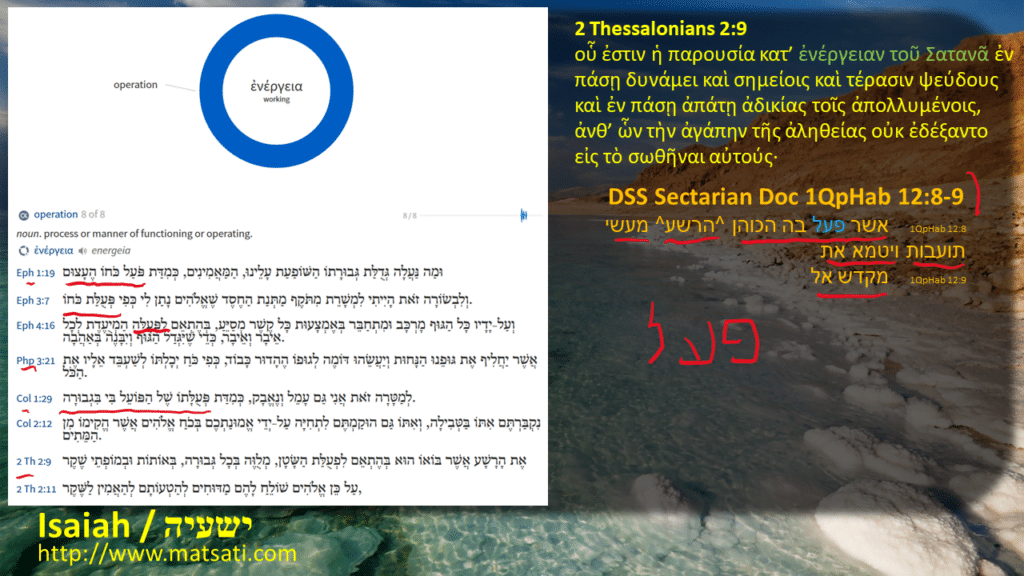
According to 2 Thessalonians 2:9, the coming of the lawless one will be in accordance with how Satan works. This is consistent with the DSS descriptions of Belial / Satan, the worthless one. He will use all sorts of displays of power with cunning and eloquent speech (Note the modern day anti-Torah sermons). Those who teach “the Torah has passed away in Jesus” come to do the work of Satan with a counterfeit message from God. Note in the pentacostal churches with tongues, this connects us to the work of Satan coming with signs and wonders; these include their so-called gifts of the spirit. The babbling that occurs is likely the kundalini spirit, and one of the signs of this is peace following the manifestation of tongues. Note that this study is not teaching against the gifts of the Spirit. This study also is not teaching against the power of God either. We need to be aware of what is actually going on today and wake up because there is great deception today! We need to be very careful to know what kind of spirit is present, as those whose message is anti-Torah are speaking from a different spirit, and are not teaching about the Jesus described according to the Bible, in the NT text. (Couple examples: Yeshua teaching commandments, Matthew 5, John 12:50) All of these things follow from Isaiah 14:12, of the spiritual connection to the fall of Belial. Another important hermeneutical technique is to be sure that the method of interpretation we use is consistent at all levels of Pardes (פרדס) and does not come against the Peshat (simply plain reading). We note that there are layers of interpretation here according to Isaiah 14. There is a spiritual root behind pride, the pride of the king of Babylon, an underlying demonic source. It very well could be the spirit that is behind this king of Babylon is the fallen one who is being described here. This is the spirit that is influencing the king himself. This idea of pride sets oneself up above (and against) God in heaven. When men refuse to perform Teshuvah, it is due to their pride and refusal to humble themselves. Pride sets itself up to presume to know more than God. All of these things are connected to the spirit realm and to what Paul is warning us of according to 2 Corinthians 6:15, Ephesians 6, and 2 Thessalonians 2:9, to name just a few locations. Based upon these references, it appears that Paul was well aware of the Sectarian writings in the DSS. All of these things provide us with a rich context to Paul’s letters and shed light on why he wrote what he did. Paul was using past literature, actual events, and future warnings, in order to teach about a current problem, and for instruction to future generations such as us today!
Because of the sinfulness and unrepentance of the people, the TgJ goes on saying, ל וְיִתפַרנְסוּן חַשִיכֵי עַמָא וְעִנוְתָנַיָא בְיֹומֹוהִי לְרֻחצָן יִשרֹון וִימיִת בְכַפנָא בְנַך וּשאָר עַמִיך יְקַטֵיל׃ 14:30 And the poor of my people shall be fed, and the meek in His days shall dwell in safety; and He shall slay with famine thy children, and the remnant of thy people He shall kill. לא אֵילִילִי עַל תַרעַך צְוַחִי עַל קִרוַך אִיתְבַרתוּן פְלִשתָאֵי כוּלְכֹון אְרֵי מִצִיפוּנָא פֹורעָנָא אָתֵי וְלֵית דִמאַחַר בִמזָמְנֹוהִי 14:31 Howl, on account of thy gate, cry on account of thy city, ye, O Philistines, all of you; ye shall be broken: because from the north vengeance is coming, and is not delaying its appointed time. לב וּמָא יְבַסְרוּן אִזגַדֵי עַמְמַיָא אְרֵי יוי שַכלְלַה לְצִיֹון וּבַה יִתרַחְצוּן וְיִחדֹון חַשִיכֵי עַמָא׃ 14:32 And what good news will they tell the messengers of the nations? That the Lord hath founded Zion, and the poor of His people shall trust in it. (TgJ) Note the significance of Isaiah 14:30, the TgJ translates the poor, meek, humble, will dwell in safety. This is the attitude that we should adopt as the children of God, realizing that all things are a gift from God! Notice how these things are also teaching us that everything depends upon our attitude. God is One. His will is perfect. If we want joy in this life, you must learn to focus on the Lord God and His Messiah Yeshua. For example, by Jewish tradition we are told that we should personally bless the LORD for each detail of our daily experience. Such a practice directs us to a deep inward appreciation for the good things God personally provides for us throughout each day. In addition to this, it is interesting to note that the word בָּר֥וּךְ translated “blessed” is related to the Hebrew word ברך for “knee.” The association of blessing to the knee and kneeling provides us with this picture of humility. For example, we kneel before the God of Israel in recognition of His mercy, grace, and blessedness and glorify His name for our personal blessings. We consider this is why Paul wrote what he did according to Ephesians 1:3 saying, בָּרוּךְ הָאֱלֹהִים אֲבִי אֲדוֹנֵנוּ יֵשׁוּעַ הַמָּשִׁיחַ, אֲשֶׁר בֵּרֵךְ אוֹתָנוּ בְּכָל בְּרָכָה רוּחָנִית בַּשָּׁמַיִם, בַּמָּשִׁיחַ “Blessed be the God and Father of our Lord Jesus Christ, who hath blessed us with all spiritual blessings in heavenly places in Messiah Jesus.” Truly we are blessed to have a God who is so close to us, and so loved us that He sent His only begotten son to die for us! What a wonderful blessed God we serve!
